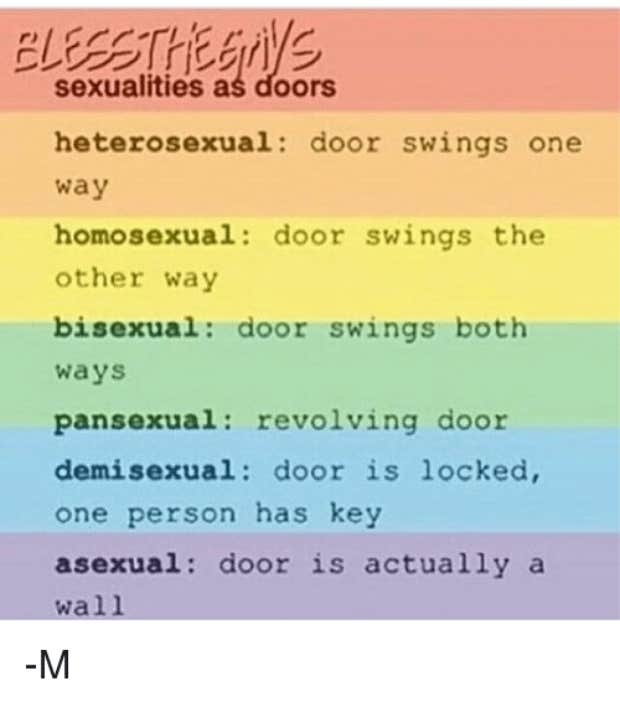How I Finally Figured Out I'm Demisexual — And Why Understanding The Asexual Spectrum Matters
Yes, labels matter.
 Jacob Lund / Shutterstock
Jacob Lund / Shutterstock I distinctly remember the moment I realized I was demisexual.
I was scrolling through Facebook, and saw a meme shared by one of my friends that listed all sorts of different sexual identities and how they’d react in different situations.
I’d never heard of demisexuality before, but I was intrigued.
When I looked up the unfamiliar term, I stared at the screen in shock. I’d finally found something that described who I was and how I felt.
What is demisexuality and what does it mean to be demisexual?
According to the Demisexuality Resource Center, the definition of demisexuality is “a sexual orientation in which someone feels sexual attraction only to people with whom they have an emotional bond. Most demisexuals feel sexual attraction rarely compared to the general population, and some have little to no interest in sexual activity.”
The term itself comes from being someone whose identity falls somewhere in the middle of the asexual spectrum (aka, a-spec), a further classification of sexual orientations represented within the human sexuality spectrum.
“Demi” is a pre-fix. taken from French, meaning half.
If you identify as demisexual, you could consider yourself halfway between an asexual and a sexual person.
For the record, asexuality is defined as "the lack of sexual attraction to others, or low or absent interest in or desire for sexual activity.
It may be considered a sexual orientation or the lack thereof. It may also be categorized more widely to include a broad spectrum of asexual sub-identities.
Asexuality is distinct from abstention from sexual activity and from celibacy, which are behavioral and generally motivated by factors such as an individual's personal or religious beliefs. Sexual orientation, unlike sexual behavior, is believed to be 'enduring'".
It seems like such a simple thing now that I’ve realized it, but growing up and living in an era of increasingly open sexuality, not knowing this was "normal" often made me feel like I was prudish at worst, or at best, a throwback.
I had always felt behind my peers in terms of sexuality.
My first sexual experiences didn’t happen until I was in my mid 20s, after college. I was never attracted to one-night stands or making out in the corner of a bar with a stranger. That kind of sexual behavior was extremely out of my comfort zone.
I felt weird and out of place. I knew I liked sex, and that made it even weirder.
Why couldn’t I do what other people did and just bring a guy home? My friends would take me to bars and try to "wing-woman" for me, but I never followed through on hookups. They felt fake and disingenuous.
For me, hookups and one-night stands felt like I was both being used and using my partner.
Even when I did experience a flash of sexual attraction, it faded quickly. Eventually, my friends threw up their hands and stopped trying to find me a hookup, to my profound relief.
If we want to break it down into my labels only across what's referred to as "the spectrum", I am a heterosexual, cisgender, demisexual woman.
That means I was born with the sexual organs of a female (my biological sex), I identify, feel like and present publicly as a woman (my gender identity, expression and presentation), and I am romantically and sexually attracted to men, but only experience sexual attraction after I have established a deep emotional connection one man in particular (my sexual orientation).

Like many of my fellow demisexuals, once I had the name for my sexual identity, I wanted to understand more about what demisexuality means.
Unfortunately, there’s not a whole lot of information available about what it's like being demisexual.
Demisexuality isn’t a commonly known or well understood orientation, even among doctors. And people who identify as demisexual often encounter scorn from those who think it’s a made-up label for people who just "don’t have a sex drive" or are being “too picky.”
Unlike pansexuality, which is defined as "sexual, romantic or emotional attraction towards people regardless of their sex or gender identity," demisexuality is more about how you experience attraction, than it is about& who you’re attracted to.
In fact, it's possible to be both demisexual and pansexual. That would mean you’re attracted to people regardless of their gender identity, but only after you’ve created an emotional bond with someone in particular.
The word "demisexuality" was first coined by a user on the Asexual Visibility and Education Network (AVEN)'s forum in 2006.
AVEN, established in 2001, strives to create discussion between asexual and sexual people to further promote understanding. They also host the world's largest online asexual community, with discussions covering the full asexual spectrum, as well as a large archive of resources.
In the 2016 Asexual Community Survey, only 8.6 percent of the 9869 respondents identified as demisexual, the second smallest showing after the ubiquitous “none of the above".
Only about one percent of the total population identifies as asexual, according to an article from U.S. News. That means it’s likely that less than 0.1 percent of the population identifies as demisexual.
That lines up with my own experiences pretty well — that the identity is growing as awareness of its existence grows, but it’s still a very small subset, even within the already-small asexual community.
Like many sexualities, demisexuality on a sliding scale; some demis need a deep intimate connection and some need just a little.
But because it falls under the umbrella of asexuality, demis consider themselves a "gray-A", “gray ace" or "grace", abbreviated terms for "gray asexuality", defined by Wikipedia as, "the spectrum between asexuality and sexuality."
But not all gray aces are demis — as that term also covers people who identify as “asexual-ish”, “sexual-ish” or even “semisexual.”
In order to understand what it feels like to be demisexual, it’s important to understand the difference between primary and secondary sexual attraction.
Primary sexual attraction is a sexual attraction based on information that is immediately available, which then leads to arousal and desire.
Here's an example of primary sexual attraction: “Chris Evans is extremely attractive and if he asked me to, I would absolutely have sex with him.”
Secondary sexual attraction is a sexual attraction that, according to AVEN, “develops over time based on a person's relationship and emotional connection with another person.”
Therefore, an example of secondary sexual attraction would be this: “Chris from my yoga class and I have been spending a lot of time together lately. We've become good friends and now he is attractive to me. Because of that connection we’ve built, if he asked me to, I would absolutely have sex with him.”
See the difference?
The cool thing is that demisexuality is one of those labels that can be adopted by anyone.
You can identify as queer, pansexual, gay, lesbian, or heterosexual and as transgender or cisgender and still consider yourself a demi.
You can also consider yourself demiromantic, which is slightly different from demisexuality in that demiromantics only experience romantic attraction after they have an emotional connection.
Although such terms are broadly used to identify people who only experience secondary attraction, what that looks like for you may look different for someone else who also identifies as demi.
When explaining demisexuality to sexual people, sometimes it’s misunderstood as a choice.
Let me be clear — it’s not.
Demisexuals aren’t choosing to abstain or to feel this way, and it also doesn’t mean we don’t want to have sex.
I like sex! I just don’t want to have it with someone I don’t have a strong connection to. The idea of a one night stand is simply not in my playbook.
Sometimes I know fairly quickly if I’m sexually attracted to someone, and sometimes it takes a lot more work to establish that connection.
“Only you can determine if the demisexual label fits you, because only you know what your experiences are like,” according to the Demisexual Resource Center. “While others can give advice on if your train of thought is going in the right direction, or help provide information, only you can label yourself.”
Michael Doré, a volunteer with AVEN, explains that a lot of demisexuals can feel like they’re “stuck between a rock and a hard place” because they just don’t fit in to either side of the human sexuality scale. They may not realize there is a full asexual spectrum out there.
“It’s really important that people have a place to go,“ Doré says. “You can feel like you’re stuck between two different worlds.”
When I finally realized I was demisexual, it made things easier to explain.
Even though I was and am a writer by trade, I often found myself at a loss for words to describe how my head and my heart felt. Sometimes I inadvertently offended sexual people because I couldn’t explain why I didn’t feel the same way about casual sex that they did.
Finding a label and a vocabulary helped me find myself.
A lot of people ask why we need so many labels, and to that I simply say that this label works for me. It’s not a choice, and it’s not a low sex drive. It’s just how I am.
Understanding that the way I feel has a name is incredibly reassuring.
Learning about demisexuality has also reassured me that I’m not alone, since now I have a community that can rally behind me.
Robin Epley is a journalist and editor from Northern California whose work has appeared on sites like Bustle, HelloGiggles and TechWire, and also in regional publications such as the Sacramento Bee. She also founded Drunk Austen, a community of feminist book nerds who like to drink. For more, follow her on Twitter at @robin_epley or @drunk_austen.


